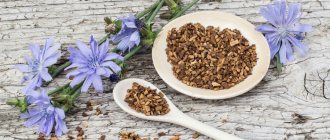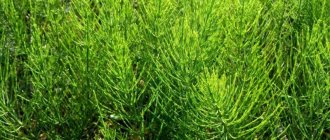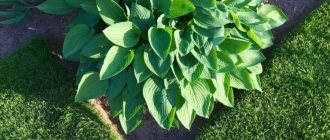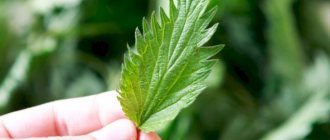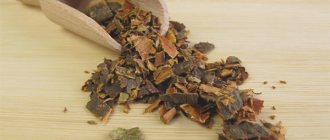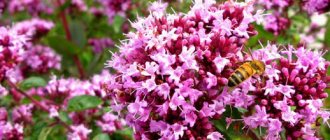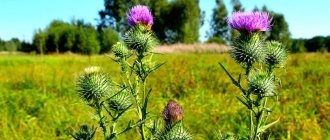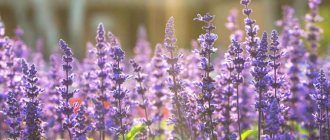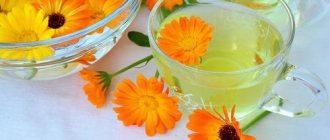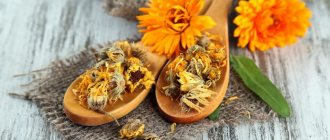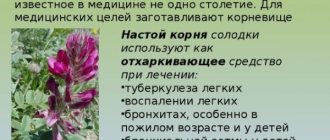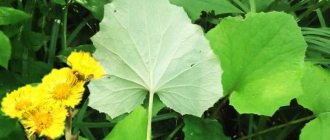General information
The science of pharmacognosy has studied the harms and benefits of the plant, and the main effect on the body is associated with the essential oil, which contains thymol, a phenol-derived substance with minimal toxicity. It has a bactericidal effect on cocoa flora and is active against fungi and parasites.
With long-term use, which is carried out strictly as prescribed by the doctor, there is a decrease in bad cholesterol levels and restoration of the liver at the cellular level. Experimentally, scientists have found that thyme decoctions have a hypotensive and cardiotonic effect, stimulate respiratory function, stop coughing and have a beneficial effect on the nervous system.
Essential oil is used as an independent remedy and is included in rubs and ointments used for bronchitis, lumbago and arthrosis of various etiologies. Medicines are also represented by infusions, briquettes, liquid extract and antitussives Pertussini Codelac Forte.
Benefits for women, men
- Thyme herb can be used in cosmetology. Infusions improve the appearance of hair, make it easier to comb and strengthen hair follicles. To do this, rub a strong decoction of thyme into the scalp or rinse your hair with it after washing.
- Thyme oil is used for inhalation when steaming the skin, which allows you to saturate the dermis with useful substances, open the pores and cleanse them of bacteria and dirt.
- They also use a toner for the skin, which helps narrow pores, normalize the functioning of the sebaceous glands, and reduce the number of inflammatory elements. To do this, pour 50 g of dry extract with a glass of boiling water, leave for half an hour and strain. The resulting infusion should be wiped on the face twice a day.
- Less concentrated infusions of thyme can be used for the whole body, in particular, as an auxiliary therapy in the treatment of cellulite and fat deposits. For this, 4 tbsp. l. thyme, pour 1 liter of boiling water and leave for 40–60 minutes. The liquid is then added to a warm bath. Frequency of use: 1–3 times a week for 10–15 minutes.
- Healing decoctions are recommended for use by women who experience severe pain during menstruation. Thyme teas can significantly reduce painful spasms and also have a beneficial effect on normalizing the cycle.
The beneficial properties of thyme can be felt not only by lovely ladies, but also by men. Teas and decoctions from this plant activate the production of enzymes that control blood circulation, which has a beneficial effect on potency. And selenium, which is part of the plant, is involved in the production of testosterone.
- For the treatment of infertility and increasing male power, the following infusion is recommended: 2 tbsp. l. chopped thyme, pour 0.5 liters of boiling water and let it brew for 2-3 hours. Strain the broth and consume twice a day for two weeks.
- Ursolic acid, which is found in sufficient quantities in thyme, fights tissue atrophy. Therefore, after intense strength training and for the speedy regeneration of muscle fibers, it is necessary to use compresses. The recipe is very simple: pour boiling water over dry or fresh thyme herb and leave for 10–20 minutes. Then remove excess moisture and wrap the plant itself in gauze. Apply the compress to the sore spot and secure tightly with cling film.
- Those men who do not want to part with their own hair need to rub a mixture of thyme oil and vodka (3-4 drops of ether per 1 teaspoon of alcohol) into the hair roots. You can use this composition no more than 2 times a week, otherwise there is a risk of drying out the scalp.
Thyme: beneficial medicinal properties
The unique composition of the aromatic herb determines its beneficial properties. The plant contains vitamins C, K, D and group B, bitterness and tannins, resins, ursolic and oleic acid. Decoctions from medicinal raw materials have powerful wound-healing, bronchodilator and antiseptic effects. Thyme is used as part of herbal mixtures for complex therapy of the following diseases:
- helminthic infestations;
- inflammatory processes of the organs of the female reproductive system;
- bacterial and viral infections;
- gastritis with reduced secretion;
- peptic ulcer of the stomach and duodenum;
- kidney inflammation;
- neuralgia, arthritis, myositis, gout;
- diabetes mellitus;
- hepatitis of various etiologies.
Course use of the medicinal product restores the acid-base balance of the body, and the components of the essential oil have a gentle effect on the nervous system. A decoction of thyme is used to gargle and wash the nasopharynx for pharyngitis, laryngitis and tonsillitis. The herb is widely used in cosmetology and is included in shampoos, hair balms, tonics and antiseptics for the care of the skin of the face and hands. The aromatic plant has found application in cooking for preparing refreshing drinks, meat and fish dishes, soups and sauces.
Side effects of thyme
- Irritation of the mucous membrane. Thyme contains two compounds - thymol and carvacrol. Research shows that people, especially those who are sensitive, may suffer from mucous membrane irritation after using this herb.
- Possibility of allergies. People with allergies to basil, cutmint, celery, rosemary and oregano are very likely to develop an allergic reaction to this plant.
- Contraindicated for hypertensive patients. Thyme has the ability to normalize blood pressure, but this does not mean that the herb is a panacea. And since the effect of thyme on blood pressure is still unproven today, people suffering from high blood pressure should better refrain from using thyme in any form or consult a doctor about taking it.
- Problems with the thyroid gland. This applies only to a special type of thyme - Thymus serpyllum. Studies conducted by a group of German researchers have shown that thyme can have a negative effect on the thyroid gland, a pituitary hormone that stimulates the thyroid gland and can lead to a decrease in thyroid hormone levels.
- Not recommended during pregnancy and breastfeeding: There is no evidence to suggest that this herb is dangerous for pregnant or breastfeeding women, but since thyme is a time-proven remedy for stimulating menstruation, pregnant women are at risk of miscarriage.
- Heart problems. Cases of serious deterioration in the condition of patients suffering from heart disease who took thyme infusions have been recorded. Despite the fact that the real cause was an excessive dose or an allergy to the entire mint family, doctors advise abstaining from this plant.
- Skin inflammation. There are cases when the tincture of this plant was used as an antiseptic to treat chronic parenchyma of the toe, but as a result, serious inflammation of the skin occurred. Before use, it is better to consult a doctor.
- Interaction with drugs. In vitro studies suggest that thyme interacts unfavorably with progesterone and estrogen. If you are taking birth control pills or medications with hormones, you should consult your doctor before using this herb. Topical application of thyme in the form of thymol is known to absorb 5-fluorouracil, which is used in chemotherapy.
- Interactions with Other Herbs: Research suggests that using thyme with supplements and certain herbs may interfere with the latter's expected hormonal effects.
- Not safe for children under 18 years of age. Children, especially those under 10 years of age and infants, are not recommended to take this herb in all forms.
Although the listed side effects of thyme are rare, it is always best to be careful when using any herbal infusion.
Thyme: beneficial properties for women
The main causes of gynecological diseases are reduced immunity, viral and infectious processes, hormonal imbalance and nervous tension. The healing properties of thyme determine its use as part of complex therapy to solve delicate problems.
Gynecology
The decoction is used to relieve symptoms that occur in the first days of the menstrual cycle: spasmodic pain in the head and lower abdomen. Usually consumed 20–30 minutes before meals.
For the treatment and prevention of inflammation of the appendages, thrush and for hygienic purposes, irrigation with a course of 5–7 procedures every other day is recommended. The event is shown at the end of the first, beginning of the second phase of the cycle. Add 2 tbsp per liter of water. l. raw materials and boil over low heat for ten minutes, after which the broth is cooled to a comfortable temperature, filtered and poured into a syringe.
Frequent irrigation disrupts the vaginal microflora and destabilizes the acid-base balance of the mucous membrane, which can lead to dryness, itching and infection during sexual intercourse.
Weight loss and beauty care
In addition to its diuretic and antibacterial effect, thyme stimulates metabolic processes and eliminates hunger. To get rid of extra pounds, it is recommended to use the decoction half an hour before meals. We should not forget about the beneficial effect of the drug on the condition of the upper layers of the epidermis and hair structure. Traditional medicine recipes have proven themselves to be excellent:
- To strengthen the bulbs and stimulate the growth of curls, rub a mixture of thyme and grape seed oils into the scalp, possibly adding a few drops of lemon juice.
- For furunculosis and acne, wiping with ice prepared from a decoction is recommended; warm compresses are also effective, after which you can lightly clean the skin.
- Adding thyme oil to your daily care products will help you look attractive and younger than your age.
Thanks to its antibacterial, astringent and tanning properties, thyme decoction copes well with excessive sweating of the feet and palms, eliminates unpleasant odor from the mouth, and is effective against diseases of the throat and gums.
Thyme in cooking
Thyme is not only used in folk medicine, but also in cooking in the creation of many dishes. A distinctive feature of this spice is its bitter taste, which makes dishes with thyme much tastier.
Seasoning is often added to dishes prepared from fish or meat to make their taste much brighter and more aromatic. When creating meat dishes, they use thyme branches, which, after heat treatment, imbue the dish with a pleasant aroma.
Spice is also added when preparing vegetable dishes or salads. Some people advise putting thyme in dishes with mushrooms, as this combination creates an unforgettable taste. Experienced housewives add this seasoning to soups, broths and borscht.
Thyme for cough
The presence of essential oil, bitterness and a complex of vitamins in the stems and inflorescences of the plant determines its medicinal properties for diseases of the nasopharynx and upper respiratory tract. Breast mixtures with thyme have an expectorant and antiseptic effect, helping to cleanse the bronchi and lungs of accumulated mucus. Purulent inflammatory processes in the throat can be relieved by rinsing, and if there is a risk of tracheitis and bronchitis, it is recommended to take a decoction in the form of tea.
You can use the following recipe: 1 tbsp. l. herbs are poured into 300 ml of water and boiled over low heat for at least five minutes. The resulting product is cooled, filtered and consumed every three hours before meals.
Thyme is also found in medications, one of which is the time-tested Pertussin. It has a bronchodilator, analgesic, antimicrobial, antispasmodic effect and is prescribed for the treatment of acute respiratory infections, whooping cough, bronchitis and tracheitis.
Decoctions and infusions of thyme: recipes and applications
- A couple of spoons of herbs brewed in a glass will help you get a good night's sleep. You need to consume a few spoons at lunch and 50 ml before bed.
- A few teaspoons poured into a glass of hot water will help cope with gastritis, cough and bronchitis. In the first case, it is taken up to 3 times a day, in the latter - up to 4 times.
- Candied fresh shoots cope with gastrointestinal problems. It is enough to sprinkle layers of sugar on the grass branches in a vessel and put them in a dark place for 2 weeks. Transfer the syrup to another container and use a spoon with tea up to 3 times a day.
Thyme during pregnancy
The period of bearing a child is not a reason for a woman to refuse her usual drinks and food. A pinch of thyme added to black or green tea for flavor will create a good mood and have the best effect on your well-being. But the use of decoctions for medicinal purposes is not indicated for all pregnant women. The following contraindications are identified:
- hypertension;
- increased uterine tone;
- diseases of the cardiovascular system;
- disorders of the thyroid gland;
- allergic mood of the body.
Thyme decoctions are used to treat inflammatory processes in the throat and gums during all stages of pregnancy. Traditional medicine is considered an excellent alternative to pharmaceuticals, which reduces the burden on the body of the mother and fetus.
For women at risk of miscarriage, rinsing, teas and decoctions with thyme are strictly contraindicated, which is explained by the high content of essential and tannin substances in the herb.
Tea with thyme, benefits
Tea with this medicinal herb, which is a natural stimulant, is tasty and very healthy. The best time to take healing tea with thyme is in the morning. It is recommended for children suffering from anemia; it removes the feeling of heaviness in the stomach when overeating, symptoms of fermentation in the intestines, and increased gas formation. After eating fatty foods, to normalize digestion, it will never be superfluous to drink a cup or two of this aromatic drink. The herb can be brewed independently, or combined with the addition of regular black tea.
Herbal medicinal tea, photo:
What are the benefits of thyme tea? This honey plant contains organic acids, flavonoids, vitamin C, resins, tannins, essential oil, and B vitamins. This list of useful ingredients has a positive effect on the body as a whole, has an antiseptic, diaphoretic, anti-inflammatory, antispasmodic, wound-healing, and disinfectant effect. Moreover, steeply brewed tea with thyme is successfully used for inhalation.
Drink more tea if you have symptoms of a cold or runny nose - essential oils will do their job, you can be sure. This tea will improve your mood, efficiency, vitality, despite its tonic effect, it will calm frayed nerves and help cope with fatigue. It is indispensable with the onset of the cold season, when viral and cold diseases become more active.
Even such an unpleasant thing as bad breath can be successfully eliminated by regular rinsing and drinking this healing tea.
Contraindications
Despite all its beneficial properties, thyme also has contraindications.
- If a person has liver or kidney disease, then these decoctions, infusions, and teas should not be consumed.
- If you have thyroid disease, especially a decrease in its function, then taking this herb is also contraindicated.
- In the presence of vascular atherosclerosis, cardiosclerosis, atrial fibrillation, the use of thyme is strictly contraindicated due to the presence of high thymol content.
- This warning also applies to those who have high acidity of gastric juice.
Thyme for healthy people, warnings
What is the effect of thyme tea on healthy people?
- Even if your health can only be envied, you still shouldn’t get carried away with long-term, frequent consumption of this tasty drink.
- Infusions and teas based on thyme help reduce the production of thyroid hormones, which inevitably leads to hypothyroidism in case of overdose.
- Do not forget that thyme helps to increase blood pressure, and does so imperceptibly, and the achieved effect lasts for a long time.
- Allergies or individual intolerance to the components of the plant can also occur, although this rarely happens.
Thyme during breastfeeding
Creeping thyme is used as an independent remedy and is included in preparations to increase lactation during breastfeeding. Before use, it is necessary to consult a doctor, since allergic reactions are possible not only in a nursing woman, but also in a baby.
To maintain sufficient breast milk production, doctors recommend drinking no more than one cup of thyme drink. The active substances in the decoction increase the body's resistance to inflammation and reduce nervous excitability, so a moderate amount of the drink will ensure a calm and deep sleep for mother and child. The baby is also recommended to take daily baths in a herbal decoction, which perfectly soothes the skin and dries out rashes and diaper rash.
Thyme in folk medicine
In folk medicine, thyme is used in various forms and for various diseases. For example:
- Teas are used to relieve fever, pain in the bronchi, general strengthening, increase libido, quench thirst and warm up in cold times.
- Ointments are used to warm the chest, muscles, joints and remove skin problems.
- Infusions are practiced for all types of diseases and are taken internally.
- Baths are also useful for rheumatism, radiculitis, skin rashes, muscle and joint diseases.
- Syrups are most often used as an expectorant.
- When used fresh, it is used to combat microbes in food.
Thyme: medicinal properties and contraindications for men
The pharmaceutical characteristics of the herb determine the benefits of thyme for men. Traditional medicine recommends the use of plant materials for the treatment and prevention of genitourinary diseases: impotence, cystitis and prostatitis. The action of herbal remedies is aimed at stabilizing the nervous system and hormonal levels, stopping inflammatory processes.
- For the purpose of relaxation and cleansing of the skin, baths with the addition of a concentrated decoction or essential oil are recommended.
- Medicinal tea made from thyme, oregano and mint has a calming, choleretic and anti-inflammatory effect. Raw materials in equal proportions, at the rate of 1 tbsp. l. half a liter of water, pour into a thermos and pour boiling water over it. The drink is ready in a few hours and is recommended to drink 100 ml 30 minutes before meals. The infusion is also taken in the treatment of colds, and adding honey to a warm decoction significantly increases the effectiveness of the healing drink.
- As a choleretic, antibacterial and diuresis stimulating agent, tea is brewed from rose hips, thyme inflorescences and St. John's wort.
- The essential oil of the plant is used to increase potency by rubbing it in a circular motion into the groin area, buttocks and sacral area.
Thyme is used in complex therapy of alcoholism, for which a concentrated drink is prepared, where 7 tsp is added to 500 ml of water. dried raw materials. With systematic use of the decoction, a group of symptoms characteristic of so-called body withdrawal disappears, mood improves and vegetative disorders are eliminated.
Chemical composition of the plant
Before using a spice to treat diseases, you need to become familiar with the characteristics of its chemical composition. The plant is often used in folk medicine because it contains a large number of beneficial microelements. A distinctive feature of the chemical composition of thyme is that its leaves contain many vitamins, fats and proteins. The plant is also rich in mineral components, which include iron, calcium, zinc, magnesium and sodium.
The ripe plant contains a lot of essential oil, which half consists of carvacrol and thymol.
